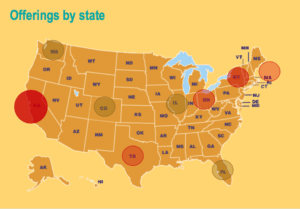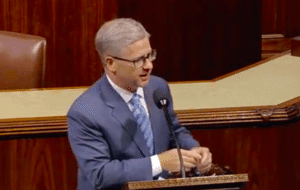
2016 brought with it many positive developments for startups in terms of capital access and tax policy. Investment crowdfunding finally went live, a number of bills to facilitate capital formation passed the House, and the startup community galvanized around a tax bill that would make it easier for startup employees to exercise their stock options. While many of these policy changes hang in limbo going into 2017, we believe that next year holds significant promise for improvements to the tax and financing policy landscape for startups.
Investment Crowdfunding Goes Live
Congress passed the JOBS Act in 2012, which legalized investment crowdfunding for non-accredited investors, allowing anyone to invest in a startup through an online platform for the first time ever. But due to some heel dragging at the Securities and Exchange Commission (SEC), it wasn’t until May of this year that investors, issuers, and platforms were finally able to begin taking advantage of equity crowdfunding.
 We have seen a number of positive developments in the seven months since the first investment crowdfunding projects went live. Data from Crowdfund Capital Advisors shows that over $17 million has been invested in crowdfunding campaigns thus far. And of the 82 campaigns launched during the first quarter of equity crowdfunding, 20 exceeded their target amount for a success rate of 24.4 percent—more than two times the success rate of popular rewards-based crowdfunding site Indiegogo. Equity crowdfunding campaigns are also seeing higher average investment commitments than rewards-based campaigns: $810 per investor, which is more than ten times the average donation on Kickstarter. Additionally, we’ve seen much greater diversity in the geographic allocation of crowdfunded capital. While venture capital skews heavily towards California, less than one-third of the earliest investment crowdfunding dollars were made to California-owned companies.
We have seen a number of positive developments in the seven months since the first investment crowdfunding projects went live. Data from Crowdfund Capital Advisors shows that over $17 million has been invested in crowdfunding campaigns thus far. And of the 82 campaigns launched during the first quarter of equity crowdfunding, 20 exceeded their target amount for a success rate of 24.4 percent—more than two times the success rate of popular rewards-based crowdfunding site Indiegogo. Equity crowdfunding campaigns are also seeing higher average investment commitments than rewards-based campaigns: $810 per investor, which is more than ten times the average donation on Kickstarter. Additionally, we’ve seen much greater diversity in the geographic allocation of crowdfunded capital. While venture capital skews heavily towards California, less than one-third of the earliest investment crowdfunding dollars were made to California-owned companies.
Congressional Efforts to Improve Capital Access Landscape
Still, crowdfunding isn’t perfect, and as we’ve previously explained, we’re skeptical about how large the sector can become under the current regulatory framework.
 Fortunately, though, there are thoughtful and dedicated members of Congress trying to address some of Regulation Crowdfunding’s pitfalls and other problematic aspects of the JOBS Act. In particular, Congressman Patrick McHenry (R-NC) has been a champion of the startup community, introducing the Fix Crowdfunding Act (H.R. 4855), which would make a number of improvements to the current equity crowdfunding landscape. We welcomed the bill’s passage in the House earlier this year but were frustrated that the heavily amended version that ultimately passed was missing a number of the startup community’s desired changes. Hopefully, in a new Congress, some of those provisions will make their way back into the bill.
Fortunately, though, there are thoughtful and dedicated members of Congress trying to address some of Regulation Crowdfunding’s pitfalls and other problematic aspects of the JOBS Act. In particular, Congressman Patrick McHenry (R-NC) has been a champion of the startup community, introducing the Fix Crowdfunding Act (H.R. 4855), which would make a number of improvements to the current equity crowdfunding landscape. We welcomed the bill’s passage in the House earlier this year but were frustrated that the heavily amended version that ultimately passed was missing a number of the startup community’s desired changes. Hopefully, in a new Congress, some of those provisions will make their way back into the bill.
In addition to the Fix Crowdfunding Act, there were a number of other bills that passed the House this year that would facilitate capital formation for startups, including the Micro Offering Safe Harbor Act and the Private Placement Improvement Act of 2016.
Of particular note was the Supporting America’s Innovators Act, also introduced by Rep. McHenry, which would remedy what’s known as the “99 Investor Problem” by raising the number of investors that can invest in angel funds from 100 to 250. Startups also welcomed House passage of the Helping Angels Lead Our Startups Act (HALOS) Act, which would loosen restrictions on startups “generally soliciting” investments at pitch events and demo days.
Stock Options Legislation
 Lawmakers on the Hill also pursued startup-friendly tax policies in 2016.
Lawmakers on the Hill also pursued startup-friendly tax policies in 2016.
Recognizing that stock options are a critical tool used by startups to attract, retain, and incentivize quality employees, members of the House and Senate proposed changes to the tax code that would make it easier for startup employees to exercise their options.
Support voiced by the startup community for the Empowering Employees through Stock Ownership (EESO) Act helped persuade the House to pass the bill and the Senate Finance Committee to approve it. However, the bill stalled in the final months of the year without a legislative vehicle in the Senate to which it could be attached. Fortunately, support for the bill is broad and bipartisan, and we are optimistic that it will move alongside any tax reform package that is considered by Congress next year.
 SEC Examines Accredited Investor Definition
SEC Examines Accredited Investor Definition
Finally, there was quite a bit of activity off the Hill in 2016. Many in the startup community were alarmed early in the year when the SEC signaled that it might update its accredited investor definition for the first time since 1983. While revisiting the definition after all these years is not necessarily problematic in and of itself, increasing the financial threshold (as the SEC signaled it might do) would be extremely damaging to the ability of startups to raise capital.
As we argued in comments submitted to the agency, raising the income requirements would substantially diminish the already limited pool of people eligible to fund startups. Instead, we suggested the agency expand the definition by adding qualitative measures for investor sophistication.
This expanded approach was mirrored in Congressman David Schweikert’s (R-AZ) Fair Investment Opportunities for Professional Experts Act, which passed the House earlier this month and would expand the definition of an accredited investor to include investors who may not meet the income or net-worth thresholds but have education or experience related to a particular investment or hold a securities-related license.
Looking Ahead to 2017
With a new Congress and a new Administration beginning in January, capital access, and tax issues may be two of the most promising bright spots for the startup community next year.
Tax reform will be a top early priority for the Trump Administration and the 115th Congress, providing an opportunity to push the EESO Act across the finish line. Additionally, with an almost entirely new SEC that promises to be significantly more pro-business than under prior leadership, there will be new opportunities for startup-friendly capital access initiatives to move at the agency.
At the Congressional level, we’re hopeful that Senate leadership will prioritize the consideration of the capital access bills that passed the House with broad, bipartisan support in 2016.
While many key issues for the tech world, like net neutrality and immigration reform, are likely to face major obstacles under the new Administration, tax and finance policy could offer some much-needed wins for the startup community and may be one of the few areas where startups find success in the coming year.
The article above is part of a series of articles that Crowdfund Insider will be publishing regarding the transition in Presidential administrations. The content will focus on necessary policy initiatives to foster economic growth and job creation by encouraging capital formation for SMEs and innovative startups.
 Emma Peck is a Policy Analyst at Engine, a nonprofit that supports the growth of technology entrepreneurship through economic research, policy analysis, and advocacy on local and national issues. Emma helps formulate Engine’s positions on a range of issues impacting startups and entrepreneurs, including immigration, access to capital, telecommunications, data security, IP and education. Prior to Engine, Emma worked on technology and telecommunications policy in Washington, D.C. for Senator Mark Warner (D-VA). She is originally from Richmond, VA and is a graduate of the University of Virginia.
Emma Peck is a Policy Analyst at Engine, a nonprofit that supports the growth of technology entrepreneurship through economic research, policy analysis, and advocacy on local and national issues. Emma helps formulate Engine’s positions on a range of issues impacting startups and entrepreneurs, including immigration, access to capital, telecommunications, data security, IP and education. Prior to Engine, Emma worked on technology and telecommunications policy in Washington, D.C. for Senator Mark Warner (D-VA). She is originally from Richmond, VA and is a graduate of the University of Virginia.


